Latest Review
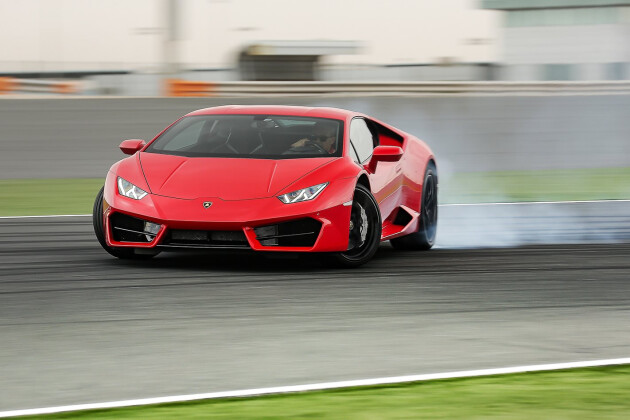
Lamborghini Huracán LP 580-2 review
Lambo loses Huracán’s front driveshafts to create the mad, rear-drive LP 580-2
We’re surrounded by heavy traffic and thick fog just outside Lamborghini’s home town of Sant’Agata, so not exactly the ideal environment in which to sample the raging bull’s new rear-drive Huracán LP580-2.
But for now, at least, the dud conditions are serving a purpose. That is, to highlight the new-found duality of character this weapon possesses.
Chief test driver Mario Fasanetto is in the passenger seat and, at his urging, we have the car configured to chill-out mode. Vehicle ‘DNA’ steering wheel switch in Strada, ESC engaged and transmission in automatic.
The 5.2-litre V10 – slightly detuned in this rear-driver, more to preserve the model hierachy, rather than really limit what is flung at the rear tyres – growls with a distant, subdued menace, while the dual-clutch transmission slips quietly between sixth and seventh depending on gradient and throttle position. The Lambo’s latent aggression is masked behind a veneer of civility.
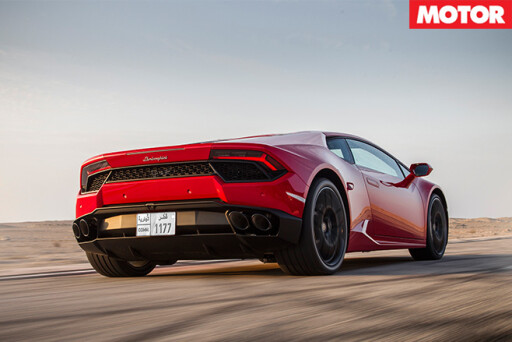 At least, it is until we close in on a meandering Fiat Doblo, prepare to overtake, and bury the accelerator to the firewall. At that moment, all hell breaks loose. The double-clutch ’box kicks down five gears from seventh to second, the V10 flicks from hum to maniacal shriek, and revs reach for the stratosphere. Suddenly it feels as though we are viewing the world through the windscreen of a street-legal Super Trofeo clone – a 427kW racer with a live-wire rear end capable of a stunning fusion of ability and emotion.
At least, it is until we close in on a meandering Fiat Doblo, prepare to overtake, and bury the accelerator to the firewall. At that moment, all hell breaks loose. The double-clutch ’box kicks down five gears from seventh to second, the V10 flicks from hum to maniacal shriek, and revs reach for the stratosphere. Suddenly it feels as though we are viewing the world through the windscreen of a street-legal Super Trofeo clone – a 427kW racer with a live-wire rear end capable of a stunning fusion of ability and emotion.
In a fast-forward blaze of colour, noise and fury, the red coupe rips past the unassuming van, just about leaving it rocking on its springs in our wake. Moments later, rolling out of the throttle, we’re back into sixth then seventh, and heavy metal thunder transitions back to easy listening.
“It’s a safety thing,” explains Fasanetto, with a completely straight face. “Even in the comfort-focused Strada mode, full throttle signals that the driver demands maximum performance, and that is exactly what he gets.”
Unlike the previous rear-drive Gallardo (the LP 550-2), which was half a nutcase pretty much all the time, the new rear-drive Huracán LP580-2 is capable of transitioning from psycho to sedate and back again before you’ve barely left your neighbourhood.
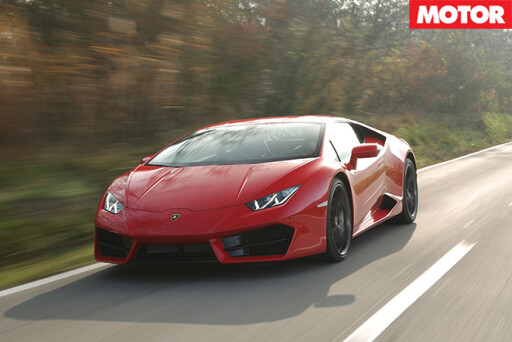 Naturally, eco credentials demand it comes with stop/start to save a drop or two of premium unleaded by silencing the engine at the traffic lights. Which disappoints the kids at a roadside kindergarten, so we turn it back on, wait a few car lengths after red changes to green, then unleash hell. The ancient ritual still ignites the desired response, at least in rural Italy where Schumacher remains a local hero and every second motorcycle rider wears Rossi-tribute yellow-over-blue number 46 livery.
Naturally, eco credentials demand it comes with stop/start to save a drop or two of premium unleaded by silencing the engine at the traffic lights. Which disappoints the kids at a roadside kindergarten, so we turn it back on, wait a few car lengths after red changes to green, then unleash hell. The ancient ritual still ignites the desired response, at least in rural Italy where Schumacher remains a local hero and every second motorcycle rider wears Rossi-tribute yellow-over-blue number 46 livery.
We follow the route Fasanetto plotted a couple of years ago for the Aventador’s shakedown. It’s a comprehensive collection of the worst of all topographic worlds: half-finished resurfacing work; deep gatorback grooves embossed by generations of buses and trucks; glassy tarmac peppered with random gravel patches; and, of course, countless corners of all shapes and radii.
Time to switch from Strada to Sport. In the 580-2, this adds a pinch of pepperoncini to the drivetrain. In the test car, which is fitted with adjustable dampers (MRS), dynamic steering (LDS) and wider 20-inch wheels (all optional), this also stiffens the ride and sharpens the turn-in response.
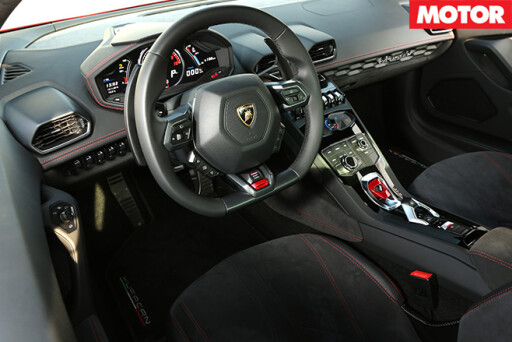 In Sport, you get what you paid for. A tiny bit or an armful of oversteer, induced by power-on or lift-off, take your pick. This attitude is quite easily provoked on cold tyres, suspicious surfaces and the entrance to tricky bends. For even more drama, just hit the silver ESC switch and make sure you have your wits about you.
In Sport, you get what you paid for. A tiny bit or an armful of oversteer, induced by power-on or lift-off, take your pick. This attitude is quite easily provoked on cold tyres, suspicious surfaces and the entrance to tricky bends. For even more drama, just hit the silver ESC switch and make sure you have your wits about you.
This Huracán does without AWD, but that’s about the only concession the buyer who has just saved around $50,000 on the $428,000 LP 610-4 model must make. All the other spine-tingling, grin-inducing, heart-stopping ingredients are still there in full force.
Like the steering wheel covered with alcantara, the pleasantly unambiguous jet-fighter controls in the centre stack, and the extra-large shift paddles attached to the column, not the wheel. There is the customisable instrumentation, which can generate more readouts than an Airbus A320 cockpit and more functions than an Apple watch.
Subtle it is not, but the full-size rev counter and the prominent gear indicator get their message across loud and clear. No head-up display, but one may specify a rear-view camera and parking sensors (which put a handful of ugly warts on the rear bar).
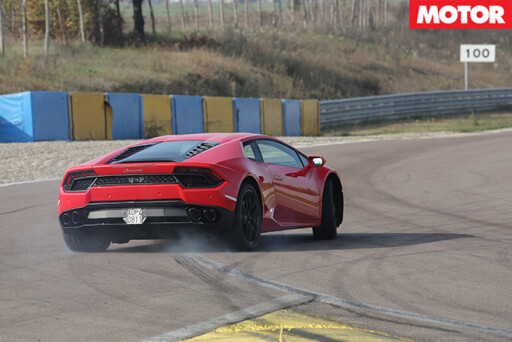 For some, the stopwatch is always the ultimate yardstick. Others measure their emotional highs in less clear-cut terms. The Huracán LP580-2 caters for both parties. It can accelerate from rest to 100km/h in a rowdy 3.4sec, losing only a couple of tenths to the LP610-4 which has a quantifiable launch advantage.
For some, the stopwatch is always the ultimate yardstick. Others measure their emotional highs in less clear-cut terms. The Huracán LP580-2 caters for both parties. It can accelerate from rest to 100km/h in a rowdy 3.4sec, losing only a couple of tenths to the LP610-4 which has a quantifiable launch advantage.
The top speed is down an inconsequential 5km/h to 320, and the fuel consumption is virtually on par. The missing 22kW can (theoretically) make a difference, however compensations come with less weight (down 33kg), the less nose-heavy 40:60 weight distribution, and the fact that the maximum torque of 540Nm no longer finds an outlet at the front wheels. Speaking of torque, it is worth noting that 75 per cent of the punch – 405Nm – is available just above idle at 1000rpm.
The Gallardo LP550-2 was a bit of a beast, rough and raucous; so sharp-edged it should have carried a liability warning. Not so the LP580-2. Its ride is more compliant than we remember of its AWD brother, the electronic watchdog is kept on a longer leash, and breakaway is smoother and more progressive.
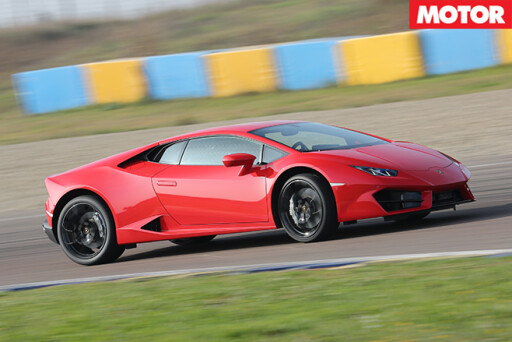 “For a start, we recalibrated springs and dampers,” explains Fasanetto. “Next, we altered the anti-roll bars to really emphasise the rear-drive handling characteristics. And although the 20-inch wheels give a better stance, vehicle dynamics are better balanced when the LP580-2 is on the standard 19-inch tyres.”
“For a start, we recalibrated springs and dampers,” explains Fasanetto. “Next, we altered the anti-roll bars to really emphasise the rear-drive handling characteristics. And although the 20-inch wheels give a better stance, vehicle dynamics are better balanced when the LP580-2 is on the standard 19-inch tyres.”
To dial in exactly the right amount of sidewall stiffness, traction and slip angle, Pirelli developed a new-generation P Zero MkII compound, which allows those four contact patches to provide both extra grip and transparency.
To put it all properly to the test, we head to Autodromo di Bologna, a small but challenging circuit hidden away between vineyards and farmland. The longer of the two straights sees the LP580-2 touching 220km/h, but the most rewarding section consists of three consecutive third-gear corners.
First, I try Sport mode with the ESC switched off (though it still keeps a watchful eye on things), but it doesn’t quite do the trick. Especially when the apex is paired to the mildest elevation change, and understeer prevails just long enough to kill a decent drift for the initial 75 per cent of the radius. Even though the handling balance is more playful now, too little is happening too late.
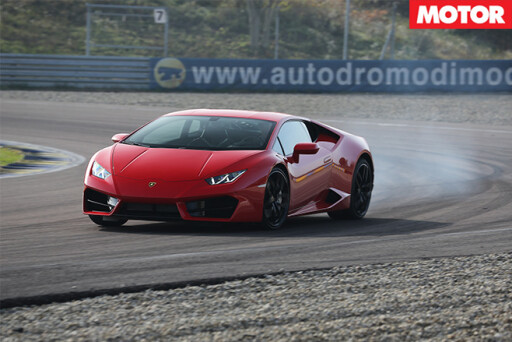 Yet one stab at the ESC button with the DNA set to Race is all it takes to reduce driver support to a pair of quick arms, an attentive right foot and a mind on alert. Lift-off-on-turn-in duly upsets the balance, shifts the weight away from the apex and makes the momentarily light rear end step out at the first serious throttle attack.
Yet one stab at the ESC button with the DNA set to Race is all it takes to reduce driver support to a pair of quick arms, an attentive right foot and a mind on alert. Lift-off-on-turn-in duly upsets the balance, shifts the weight away from the apex and makes the momentarily light rear end step out at the first serious throttle attack.
Do it properly and the reward is a long, smooth slide accompanied by the howl of tortured Pirelli rubber and more than just a whiff of smoke. At that moment, happiness really is a red Huracán LP580-2, a heavy right hoof, a firm grip at the wheel and a pair of eyes fixed on the next apex.
Like so many desirable cars, this one grows on the driver with every kilometre you put on the clock. And like all powerful rear-wheel drive efforts, regardless of engine location, the new Lambo is a handful in the wet with ESC off, as well as around town where over-the-shoulder visibility is a guessing game.
The software is largely up-to-date, though it could do with certain upgrades like a separate damper control button – a drive select program allowing you to blend different shock absorber, drivetrain, steering and ESC calibrations – as well as tweaked transmission software to permit coasting.
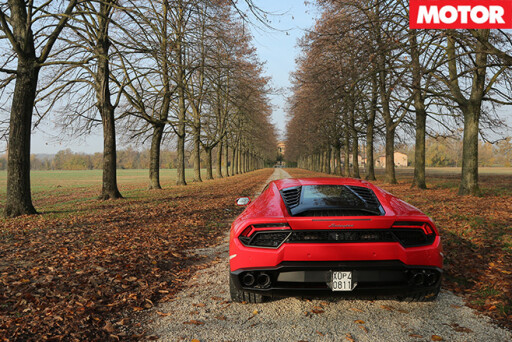 Tech-heads may also miss a bunch of assistance systems, the latest connectivity wizardries and high-intensity headlamps. Purists may lament the demise of the clonkety-clonk manual transmission, the old-fashioned ignition key and the manual handbrake. However, everybody is bound to appreciate the fast-acting and intuitive U-shaped reverse gear handle, the MMI ergonomics and the anatomically faultless driving position.
Tech-heads may also miss a bunch of assistance systems, the latest connectivity wizardries and high-intensity headlamps. Purists may lament the demise of the clonkety-clonk manual transmission, the old-fashioned ignition key and the manual handbrake. However, everybody is bound to appreciate the fast-acting and intuitive U-shaped reverse gear handle, the MMI ergonomics and the anatomically faultless driving position.
We finish the day where we started, in the Modenese hinterland, where the fog has long since lifted and the rush hour has not yet begun. Fully unleashed, the rear-drive Huracán is anything but a cold and soulless performer. Instead, it grabs you by the hips and ignites your senses.
Like only the very best sportscars, it’s involving and emotional, tactile and communicative, challenging and rewarding. Once car and driver have agreed on terms and conditions, the LP580-2 will take you on a tour de g-force, which will never be deleted from the memory bank inside your head.
4.5 OUT OF 5 STARS
SPECS: LAMBO HURACÁN LP 580-2
Body: 2-door, 2-seat coupe
Drive: rear-wheel
Engine: 5204cc V10, DOHC, 40v
Bore/stroke: 84.5 x 92.8mm
Compression: 12.7:1
Power: 427kW @ 8000rpm
Torque: 540Nm @ 6500rpm
Power/weight: 307kW/tonne
Transmission: 7-speed dual-clutch
Weight: 1389kg (dry)
Suspension(f): A-arms, coil springs, adaptive dampers, anti-roll bar
Suspension(r): A-arms, adaptive dampers, anti-roll bar
L/W/H: 4459/2236/1165mm
Wheelbase: 2620mm
Tracks: 1168/1620mm
Steering: electrically-assisted rack-and-pinion
Brakes: (F) 380mm ventilated discs; 8-piston calipers
Brakes: (R) 356mm ventilated discs; 4-piston calipers
Wheels: 19.0 x 8.5-inch (f); 19 x 11.0-inch (r)
Tyre sizes: 245/35 R19 (f); 305/35 R19 (r)
Tyres: Pirelli P-Zero MK II
Pros: Increased involvement; sharp pricing; that engine
Cons: Can be a handful; strong competition
Price: $378,900
In detail: the Lambo drifter
Less power, less weight, but not the lesser sibling
ONE: DESIGN BRIEF
LP 580-2 differentiated from its all-wheel drive sibling by new front and rear bumpers with matching aerodynamic aids and a new design of wheel – 19s standard, 20s are optional. Carbon-ceramic brakes also optional, though the standard stoppers are more than adequate.
TWO: NO OPTIONS
Steel suspension and fixed-rate dampers are standard with magnetic dampers and Lambo’s controversial Dynamic Steering optional. Standard setup so good the optional extras seem unnecessary.
THREE: INSIDE STORY
Unlike Lambos of old, the driving position is spot-on and the Audi-derived switchgear – including the clever digital instrument cluster shared with the TT – works well.
FOUR: DIET TIME
Hybrid aluminium/carbon construction identical to the all-paw car, however weight drops 33kg thanks to the deletion of the all-wheel drive mechanicals. Weight distribution shifts from 42:58 to 40:60.
FIVE: POWERHOUSE
Decrease of 22kW/20Nm largely academic, as the Huracán’s 5.2-litre V10 remains ferociously fast and outstandingly vocal. Revs to 8500rpm and produces 427kW/540Nm; 0-100km/h takes a claimed 3.4sec.


